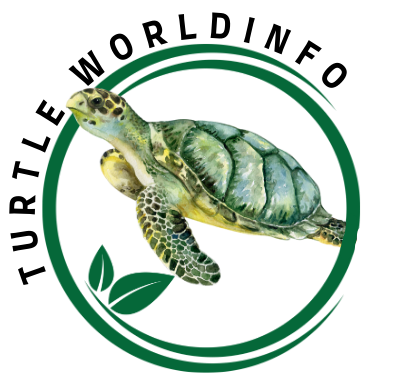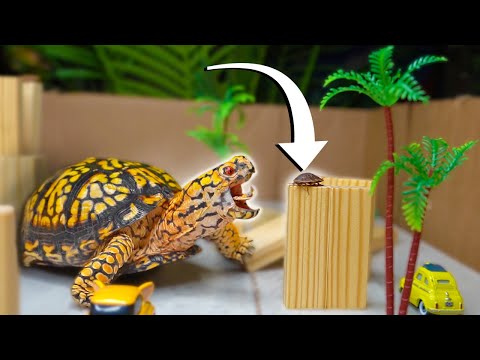Box turtles are fascinating reptiles known for their unique appearance and charming personalities.

As a responsible turtle owner, it’s essential to understand the dietary needs of your box turtle to ensure its overall health and well-being. A well-balanced diet is crucial in keeping these turtles happy and thriving.
This article will explore the various foods that make up a box turtle’s diet and provide valuable insights into their nutritional requirements.
Box Turtle Diet
Box turtles are omnivorous creatures, meaning they consume a mix of plant-based and animal-based foods. Their diet typically includes vegetables, fruits, insects, worms, and protein-rich foods.
To maintain a healthy box turtle, offering a diverse range of food items that cater to their nutritional needs is essential.
Essential Nutrients
Before diving into specific food choices, look at the essential nutrients box turtles require. These include protein, fiber, vitamins, minerals, and calcium. A balanced mix of these nutrients will help support their growth, shell development, immune system, and overall vitality.
Vegetables and Fruits
Vegetables and fruits form an integral part of a box turtle’s diet. Dark leafy greens like kale, collard, and mustard are rich in vitamins and minerals and should be included regularly.
Other suitable vegetables include carrots, squash, bell peppers, and green beans. For fruits, opt for options like berries, melons, and apples, ensuring they are cut into small, bite-sized pieces.
Insects and Worms
In addition to plant-based foods, box turtles also require a source of animal protein. Insects and worms are an excellent choice for fulfilling this need.
Crickets, mealworms, earthworms, and snails are all popular choices. Providing live prey whenever possible is important as the movement stimulates the turtle’s natural hunting instincts.
Protein-Rich Foods
Aside from insects and worms, other protein-rich foods can be offered to box turtles. Cooked eggs, such as hard-boiled eggs, are a good source of protein.
High-quality commercial turtle food pellets can also be included in their diet. However, these should not be the sole source of nutrition and should be supplemented with fresh foods.
Calcium Supplements
Calcium is crucial for maintaining strong and healthy shells in box turtles. To ensure they receive an adequate amount, calcium supplements should be provided.
A crushed cuttlebone or calcium powder can be sprinkled on their food several times weekly. The supplementation helps prevent calcium deficiencies and related health issues.
Avoidance of Toxic Foods
While it’s essential to focus on what box turtles should eat, knowing which foods to avoid is equally vital. Certain foods, such as onions, garlic, mushrooms, and rhubarb, can be toxic to box turtles and should never be included in their diet.
Additionally, avoid offering foods high in salt, sugar, or artificial additives, as they can harm their health.
Hydration Needs
Maintaining proper hydration is essential for box turtles. In addition to a shallow water dish for drinking, providing a shallow water container for soaking is crucial.
Soaking helps keep them hydrated and aids in shell health and shedding. Ensure the water is clean and changed regularly to prevent bacteria buildup.
Feeding Frequency
The feeding frequency depends on the box turtle’s age and size. Juvenile box turtles should be fed daily, while adult turtles can be fed every other day.
Not overfeeding them is important, as obesity can lead to various health issues. Monitoring their weight and adjusting the feeding schedule accordingly is recommended.
Feeding Techniques
When offering food to your box turtle, consider providing various options. Placing the food items in different locations within their enclosure encourages natural foraging behavior.
You can also try wiggling or moving the food to attract their attention and stimulate their hunting instincts.
Outdoor Feeding Considerations
If you allow your box turtle to roam outdoors, you may notice them grazing on grass, flowers, and weeds. While this can supplement their diet, it’s essential to ensure that the plants are safe and free from pesticides or other harmful substances.
Creating a designated outdoor enclosure with turtle-friendly plants is a great way to provide them additional foraging opportunities.
Signs of a Balanced Diet
A well-balanced diet manifests in a healthy and active box turtle. Signs of a balanced diet include a smooth and properly formed shell, vibrant colors, alertness, and a good appetite. Regular veterinary check-ups can also help ensure their diet meets their specific needs.
Conclusion
Providing a well-balanced diet is crucial for the health and happiness of box turtles. Incorporating a mix of vegetables, fruits, insects, worms, and protein-rich foods ensures they receive the essential nutrients they need to thrive.
By understanding their dietary requirements and making informed choices, you can contribute to the well-being of your box turtle for years to come.
FAQs
Where can I learn more about box turtle care?
To learn more about box turtle care, consult reptile care books, or reputable online sources, or seek guidance from experienced reptile keepers.
Can I offer box turtles lettuce?
While lettuce can be occasionally offered as a treat, it lacks significant nutritional value and should not be a staple food in their diet.
How do I know if my box turtle gets enough calcium?
Signs of calcium deficiency in box turtles include soft or deformed shells, weakness, and a lack of appetite. Consult a reptile veterinarian if you suspect any health issues.
Are there any alternative calcium sources for box turtles?
Some alternative calcium sources for box turtles include crushed eggshells, calcium-rich vegetables like kale, and commercially available calcium supplements.
How long can a box turtle go without food?
While the duration varies, a healthy adult box turtle can typically go without food for several weeks. However, ensuring they have access to clean water during this time is important.

